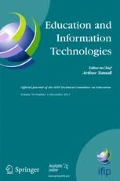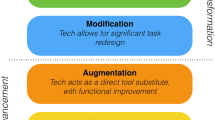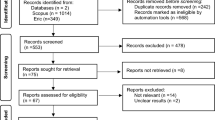Abstract
This survey-based study explores the nature of Digital Divide among Ghana’s basic (primary and junior high) schools from the perspective of Teachers’ Digital Literacy and their usage of digital technologies in school. The ICT-enhanced Teacher Standards for Africa (ICTeTSA) Framework comprising digital attitude, knowledge, skills and application components was used for measuring the perceived Teacher Digital Literacy, while, the European Union’s rubrics for measuring ICT frequency in schools was adopted for estimating the extent of teachers’ digital technology usage/activities. The study covered six districts in Ghana with 233 teachers (n = 233) sampled from 45 schools. Based perceptions of the Teacher Digital Literacy two significantly different Digital Divide clusters were found among schools that diverged based on the teachers’ digital application component of Teacher Digital Literacy. While, most schools teachers claimed an above average level of Teacher Digital Literacy; however, more than 50% of the schools are digitally proactive. Suggesting that teachers appear not to be actually using ICT tools and digital resources for professional practice. The cluster of schools differentiated by the extent of digital activities (TDA) were performed weekly. The study reveals several critical issues of teachers’ digital empowerment for technology in Ghana’s basic schools, of which school-based management (SBM) governance be adapted to address them.



Similar content being viewed by others
References
Agyei, D. D. (2013). Analysis of technology integration in teacher education in Ghana education in Ghana. Journal of Global Initiatives: Policy, Pedagogy, Perspective, 8(1), 69–86.
Agyei, D. D. (2019). Needs analysis to large-scale implementation: Using collaborative design to support ICT integration. In J. Pieters, J. Voogt, & N. P. Roblin (Eds.), Collaborative Curriculum Design for Sustainable Innovation and Teacher Learning (springer O, pp. 105–114). Cham: Springer Nature Switzerland AG. https://doi.org/10.1007/978-3-030-20062-6_6.
Agyei, D. D., & Voogt, J. (2010). ICT use in the teaching of mathematics: Implications for professional development of pre-service teachers in Ghana. Education and Information Technologies, 16(4), 423–439. https://doi.org/10.1007/s10639-010-9141-9.
Agyei, D. D., & Voogt, J. M. (2011). Exploring the potential of the will, skill, tool model in Ghana: Predicting prospective and practicing teachers’ use of technology. Computers in Education, 56(1), 91–100. https://doi.org/10.1016/j.compedu.2010.08.017.
Buabeng-Andoh, C. (2012). Factors influencing teachers ’ adoption and integration of information and communication technology into teaching: A review of the literature. International Journal and Development Using Information and Communication Technology, 8(1), 136–155.
Burns, M., Santally, M. I., Halkhoree, R., Roopesh, S., Juggurnath, B., & Rajabalee, Y. B. (2019). Information and Communications Technologies in Secondary Education in Sub-Saharan Africa Policies, Practices, Trends, and Recommendations. Retrieved March 19, 2020, from https://mastercardfdn.org/wp-content/uploads/2019/11/ICT-in-Secondary-Education.pdf.
Caldwell, B. J. (2005). School-based management. Education Policy Series. Brussels: International academy of Education (IAE) and the International Institute for Educational Planning (IIEP) Retrieved from http://www.unesco.org/iiep.
Chigona, A., Chigona, W., & Davids, Z. (2014). Educators’ motivation on integration of ICTs into pedagogy : Case of disadvantaged areas. South African Journal of Education, 34(3), 1–8. https://doi.org/10.15700/201409161051.
CLIP. (2013). Definitions and Models Information Literacy. Retrieved August 1, 2015, from http://www.informationliteracy.org.uk/information-literacy-definitions/definitions-of-il/
Cohen, L., Manion, L., & Morrison, K. (2007). Research Methods in Education (6th ed.). New York: Routhledge Taylor and Francis Group.
David, J. L. (1989). Synthesis of research on school-based management. Education Leadership, 45–53.
Edumadze, J. K. E. (2015). The integration of information and communication Technology for Teaching and Learning at Ghanaian colleges of education: ICT tutors’ perception. African Journal of Teacher Education, 4(2 part II). Retrieved from https://journal.lib.uoguelph.ca/index.php/ajote/article/view/3095/3781
Edumadze, J. K. E., & Owusu, A. A. (2013). Use of information and communication Technology for Teaching and Learning in Ghanaian universities : Case of University of Cape Coast. International Journal of Computing Academic Research, 2(6), 266–277.
Engen, B. K., & Øgrim, L. (2009). Integrating ICT without throwing the baby out with the bathwater. Proceedings of World Conference on E-Learning in Corporate, Government, Healthcare, and Higher Education (E-Learn 2009).
European Union. (2013). Survey of schools : ICT in education, Benchmarking Access and Attitudes to Technology in Europe’s schools. Belgium. https://doi.org/10.2759/94499.
Ferrari, A., Punie, Y., & Redecker, C. (2012). Understanding digital competence in the 21st century: An analysis of current frameworks. 21st Century Learning for 21st Century Skills, 79–92. https://doi.org/10.2791/82116.
Fragoso, S., Cogo, D., & Brignol, L. D. (2011). What does it mean to bridge the divide? Learning from spontaneous practices towards ICTs. In J. Steyn & G. Johanson (Eds.), ICTs and sustainable solutions for the digital divide: Theory and Perspectives. (pp. 151–169). New York: Information Science Reference (IGI Global). https://doi.org/10.4018/978-1-61520-799-2.ch002.
Fuchs, C., & Horak, E. (2008). Africa and the digital divide. Telematics and Informatics, 25(2), 99–116. https://doi.org/10.1016/j.tele.2006.06.004.
Gallardo-Echenique, E. E., Marqués-Molias, L., & de Oliveira, J. M. (2015). Digital competence in the knowledge society. MERLOT Journal of Online Learning and Teaching, 11(1), 1–16.
Ghana Statistical Service Regional. (2013). 2010 population and housing census: Regional analytical report. Accra.
GIFEC. (2013). Study of the digital in Ghana. Accra.
GOG. (2003). The Ghana ICT for accelerated development (ICT4AD) policy. Accra: Ministry of Information and Communication Retrieved from https://www.ict.gov.gh.
Gyamfi, A. (2005). Closing the digital divide in sub-Saharan Africa: Meeting the challenges of the information age. Information Development, 21(1), 22–30. https://doi.org/10.1177/0266666905051910.
Hall, R., Atkins, L., & Fraser, J. (2014). Research article: Defining a self-evaluation digital literacy framework for secondary educators: The DigiLit Leicester project. Research in Learning Technology, 22(1063519), 1–17. https://doi.org/10.3402/rlt.v22.21440.
Heeks, R. (2008). ICT4D 2.0: The next phase of applying ICT for international development. Computer, 41(6), 26–31. https://doi.org/10.1109/MC.2008.192.
Heeks, R. (2009). Development informatics where next for ICTs and international development? Development informatics, working paper series. Manchester: Development Informatics Group Retrieved from http://www.sed.manchester.ac.uk/idpm/research/publications/wp/di/di_wp42.htm.
Hohlfeld, T. N., Ritzhaupt, A. D., Barron, A. E., & Kemker, K. (2008). Examining the digital divide in K-12 public schools: Four-year trends for supporting ICT literacy in Florida. Computers in Education, 51(4), 1648–1663. https://doi.org/10.1016/j.compedu.2008.04.002.
Isiyaku, D. D., Ayub, A. F. M., & Abdulkadir, S. (2015). Empirical modelling of information communication technology usage behaviour among business education teachers in tertiary colleges of a developing country. South African Journal of Education, 35(4), 1–15. https://doi.org/10.15700/saje.v35n4a1101.
ITU. (2012). Toolkit on environmental sustainability for the ICT sector, 314. Retrieved from http://www.itu.int/ITU-T/climatechange/ess/index.html
ITU. (2014). Measuring the information society. 2014 Report (Vol. 8). Geneva. https://doi.org/10.3359/oz0303157
ITU. (2015). Measuring the information society report 2015. International Telecommunication Union. Geneva. https://doi.org/10.3359/oz0303157.
JISC. (2013). Developing digital literacies. Overview. Retrieved April 30, 2015, from http://www.jisc.ac.uk/whatwedo/programmes/elearning/developingdigitalliteracies.aspx
Lund, A., Furberg, A., Bakken, J., & Engelien, K. L. (2014). What does professional digital competence mean in teacher education ? Nordic Journal of Digital Literacy, 9(4), 281–299.
Markauskaite, L. (2006). Towards an integrated analytical framework of information and communications technology. Information Research, 11(3).
McKenney, S. (2013). Designing and researching technology-enhanced learning for the zone of proximal implementation. Research in Learning Technology, 21(SUPPL.1), 1–9. https://doi.org/10.3402/rlt.v21i0.17374.
Mereku, K., & Yidana, A. I. (2011). Pan-African research agenda on the pedagogical integration of ICTs: Ghana Report. Accra.
Mihai, M., & Nieuwenhuis, J. (2015). Management challenges in an information communication technology (ICT) network in rural schools. South African Journal of Education, 35(4), 1–10. https://doi.org/10.15700/saje.v35n4a1203.
MoE. (2015). ICT in education policy. Accra: Ministry of Education/Government of Ghana Retrieved from http://www.moe.gov.gh/assets/media/docs/ICT_in_Education_Policy_August_2015_new.pdf.
MoE/News. (2016). Ashanti Region School Teacher get laptop computers. Retrieved January 1, 2017, from http://www.moe.gov.gh/site/news/222
MOE/PR. (2015). Ministry Trains Basic Education Teachers in ICT. Retrieved October 15, 2016, from http://www.moe.gov.gh/site/news/106
Natia, J. A., & Seidu, A. (2015). Promoting teaching and learning in Ghanaian basic schools through ICT. International Journal of Education and Development Using Information and Communication Technology (IJEDICT), 11(2), 113–125 Retrieved from http://files.eric.ed.gov/fulltext/EJ1074173.pdf.
Nemer, D. (2015). From digital divide to digital inclusion and beyond : A positional review is access enough ? The Journal of Community Informatics, 11(1), 1–9.
OECD. (2001). Understanding the digital divide. Paris: Organisation for Economic Co-Operation and Development (OECD) Publications. https://doi.org/10.1002/9780470670590.wbeog441.
Pallant, J. (2001). SPSS survival manual: A step by step guide to data analysis for windows (version 10 and 11). Maidenhead: Open University Press Retrieved from https://www.openup.co.uk/spss.
Patrinos, H. A., Barrera-Osorio, F., Fasih, T., & Santibáñez, L. (2009). Decentralized decision-making in schools: The theory of evidence on school-based management. Decentralized decision-making in schools. Washington, DC: The International Bank for Reconstruction and Development / The World Bank. https://doi.org/10.1596/978-0-8213-7969-1.
Perkins, D. A., & Zimmerman, M. A. (1995). Empowerment theory , research , and application. American Journal of Community Psychology, 23(5).
Quaicoe, J. S., & Pata, K. (2015a). Factors determining digital divide in Ghana’s basic schools. In P. Cunningham & M. Cunningham (Eds.), IST-Africa 2015 conference proceedings (pp. 4–11). Lilongwe: IEEE Xplore.
Quaicoe, J. S., & Pata, K. (2015b). Modelling factors influencing digital readiness : A case of teachers in Ghana ’ s basic school system. In F. W. B. Li, R. Klamma, M. Laanpere, J. Zhang, B. F. Manjón, & R. W. H. Lau (Eds.), Advances in web-based learning – 14th ICWL 2015 (pp. 271–277). Guangzhou: Springer Retrieved from http://link.springer.com/chapter/10.1007/978-3-319-25515-6_27.
Quaicoe, J. S., & Pata, K. (2015c). The teachers ’ digital literacy determining digital divide in public basic schools in Ghana. In S. Kurbanoğlu, J. Boustany, S. Špiranec, E. Grassian, D. Mizrachi, & L. Roy (Eds.), Information literacy: Moving toward sustainability, European conference on information literacy (ECIL) 2015 (pp. 154–162). Tallinn: Springer Retrieved from http://link.springer.com/chapter/10.1007/978-3-319-28197-1_16.
Quaicoe, J. S., & Pata, K. (2016). Digital divide in learning Services in Ghana ’ s basic school. In D. K. W. Chiu, I. Marenzi, U. Nanni, M. Spaniol, & M. Temperini (Eds.), Advances in web-based learning – ICWL 2016 (pp. 83–88). Rome: Springer International Publishing. https://doi.org/10.1007/978-3-319-47440-3_9.
Quaicoe, J. S., Pata, K., & Jeladze, E. (2016). Digital learning ecosystem services and educational change in Ghana’s basic schools. In L. G. Chova, A. L. Martinez, & I. C. Torress (Eds.), EDULEARN16 Proceedings, 8th annual International Conference on Education and New Learning Technologies, 4th-6th July (pp. 4887–4895). Barcelona: IATED Academy.
Republic of Ghana/National Council for Curriculum and Assessment. (2019). National pre-Tertiary Education Curriculum Framework. Accra.
Robles, J. M., & Torres-Albero, C. (2012). Digital divide and the information and communication Society in Spain. Sociologija i Prostor, 443(460), 291–307. https://doi.org/10.5673/sip.50.3.1.
Russell, S. E., & Steele, T. (2013). Information and communication technologies and the digital divide in Africa: A review of the periodical literature, 2000-2012. Electronic Journal of Africana Bibliography, 14.
Sahoo, K. C., & Das, S. (2011). Employee empowerment : A strategy towards workplace commitment. European Journal of Business and Management, 3(11), 46–55.
Techatassanasoontorn, A. A., Huang, H., Trauth, E. M., & Juntiwasarakij, S. (2011). Analysing ICT and development: Thailand’s path to the information economy. Journal of Global Information Management, 19(1), 1–29. https://doi.org/10.4018/jgim.2011010101.
The World Bank. (2007). What is school-based management. Washington, DC.
UNESCO-IICBA. (2012). ICT-enhanced Teacher Standards for Africa (ICTeTSA). Addis Ababa. Retrieved from http://unesdoc.unesco.org/images/0021/002161/216105e.pdf 20/11/2013.
United Nations. (2015). Transforming our world: The 2030 agenda for sustainable development. https://doi.org/10.1007/s13398-014-0173-7.2.
van Dijk, J. (2012). The evolution of the digital divide: The digital divide turns to inequality of skills and usage. In J. Bus et al. (Ed.), Digital Enlightenment Yearbook 2012 (pp. 57–75). IOS Press. https://doi.org/10.3233/978-1-61499-057-4-57.
Warschauer, M. (2010). A literacy approach to the digital divide. In M. A. Pereyra (Ed.), Las mulialfabetizaciones en el espacio digital. Ediciones Aljibe: Malaga.
Williams, K. (2001). What is the digital divide? Convergence: The International Journal of Research into New Media Technologies, 7(4), 96–111. https://doi.org/10.1177/135485650100700406.
Wilson, K. B., & Boateng, K. A. (2014). Integrating ICTs into the teaching process: Issues in pedagogical practices in teacher education. International Journal of Computing Academic Research, 3(4), 2305–9184 Retrieved from http://www.meacse.org/ijcar.
World Development Report. (2016). Digital Adoption Index(DAI): Measuring the Global Spread of Digital Technologies. Retrieved May 10, 2017, from http://pubdocs.worldbank.org/en/587221475074960682/WDR16-BP-DAI-methodology.pdf
Yu, P. K. (2002). Bridging the digital divide : Equality in the information age: Equality in the information age. Texas A&M Law Scholarship, 1. Retrieved from http://scholarship.law.tamu.edu/facscholar/477
Author information
Authors and Affiliations
Corresponding author
Additional information
Publisher’s note
Springer Nature remains neutral with regard to jurisdictional claims in published maps and institutional affiliations.
Rights and permissions
About this article
Cite this article
Quaicoe, J.S., Pata, K. Teachers’ digital literacy and digital activity as digital divide components among basic schools in Ghana. Educ Inf Technol 25, 4077–4095 (2020). https://doi.org/10.1007/s10639-020-10158-8
Received:
Accepted:
Published:
Issue Date:
DOI: https://doi.org/10.1007/s10639-020-10158-8




